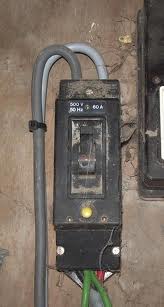RCD's

What does a circuit breaker do?
A common misconception is that the circuit breakers(fuses) protect us from electric shock, this is not the case. Circuit breakers in the consumer unit only protect the cable from overloading. For instance a 6amp circuit breaker (which is normally the lowest you will find in your consumer unit) will not trip unless more that 6 amps passes through it. It only takes 0.05 amp to stop your heart. Circuit breakers do not protect people from electric shock.
What does an RCD do?
A Residual Current Device is designed to trip when there is a current leakage to earth. i.e. if you touched a live part and the current passes through your body to earth then the RCD would trip. This havens very quicley and prevents a serious shock.
Where do you need RCD protection the most
Hand held devices need RCD protection especially for outdoor appliances. Every plug socket should have RCD protection.
If your RCD keeps tripping consider these actions.
Unplug everything in the property and see if the RCD still trips. If this solves the problem plug the items back in one by one until you find the piece of equipment that trips the RCD. it is important to remove the plug from the socket not just to switch it off.
Switch off cookers and central heating and see if this solves the problem.
Check for water leaks, when water leaks into an electrical fitting it can cause a short and cause the RCD to trip. If you do find a leak call an electrician to isolate the circuit that is affected by the water.
It may be the RCD that is faulty, if the unit has not been regulary tested via the test button it may have become chocked up with dust, then it will need replacing or if it it is an old RCD you may need a new consumer unit.
If you have an old type of RCD called an ELCB that looks like this,

you will need an electrician to check out your system and you will probably need a new consumer unit.
Please call us to test your RCD for any further advice and we will be happy to help!
There is more information here RCD's on the Electrical Safety Councils website.